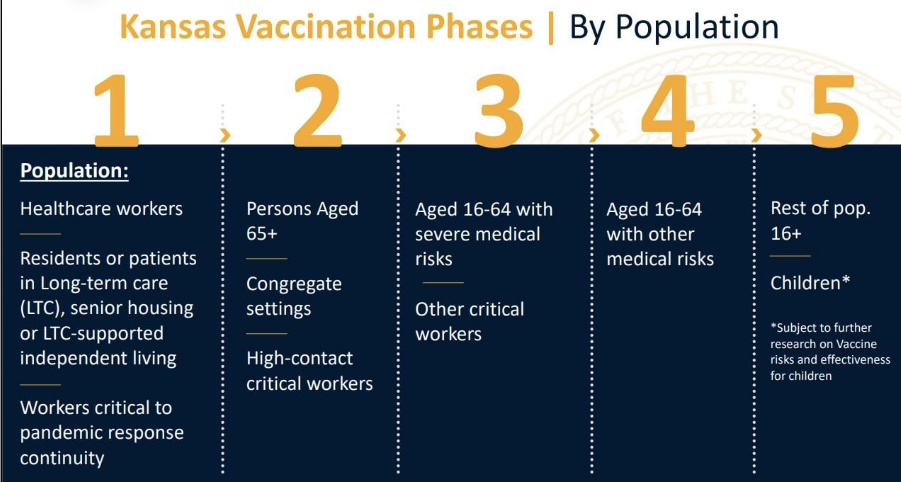
MISSION, Kan. (AP) — Kansas prisons ravaged by COVID-19 are set to be prioritized for vaccinations next — frustrating news for some lawmakers but welcome by inmates’ families and activists.
The state prison system — housing about 8,600 inmates — has reported 5,320 cases among offenders and an additional 1,076 among staff. Thirteen inmates and four staff members have died.
Gov. Laura Kelly confirmed Thursday that inmates would be vaccinated after health care workers and residents of long-term care facilities. She said they were being prioritized based on guidance from doctors and public health experts. The second group also will include people 65 and older and critical workers such as firefighters, law enforcement officers, meatpacking employees, grocery store workers, teachers and child care workers.
Incoming Senate Majority Leader Gene Suellentrop, a Wichita Republican, said if it were “early in the game,” he’d say, “Let’s do it,” because the state pays for inmates’ medical care.
“With the percentage of occupants at a such high level already exposed and the antibodies are there for close to a year, I don’t know that it makes total sense,” Suellentrop said.
House Speaker Ron Ryckman Jr., an Olathe Republican, also criticized the plan to vaccinate inmates relatively early, saying, “We’re going to have a lot of discussion.”
But Nadine Johnson, executive director of the ACLU of Kansas, said the vaccines were critical.
“The virus has run rampant within Kansas’s crowded prisons and jails, but does not stop at those walls; it continues to threaten corrections staff and officers, their families, and communities statewide,” she said in a written statement, adding that some the inmates shouldn’t even be behind bars. “There are people incarcerated in our state’s correctional facilities for specious reasons founded in an unjust system. Their situation needs attention and action. Vaccination does not absolve that need.”
Deana Estrada, whose fiancé, Ronnie Loggins, got COVID-19 while incarcerated at the state prison in Lansing on drug and explosives charges, said the resistance to vaccinating inmates is “cruel.” Estrada, 34, said the prison outbreak has complicated efforts to treat Loggins for cancer. A clemency request is pending.
“They may have made bad choices and stuff, but obviously they didn’t do enough bad choices to make them be put on death row,” said Estrada, who lives in Junction City.
Demand for the vaccine is strong with the virus surging. Statewide the number of deaths rose by 121 from Wednesday to Friday, taking the state’s total to 3,148 or one case for every 925 of its 2.9 million residents. The number of confirmed cases rose by 5,504 to 242,322, or one for every 12 residents.

The rollout has been clunky at times. At Ellinwood Hospital in Barton County, there was confusion last week when the first shipment of 30 doses of the Moderna vaccine arrived without any notice. Staff hastily stowed them in the freezer before realizing they didn’t need to be kept at such cold temperatures and then had to call the manufacturer to see if they were still safe to administer. The verdict was yes.
Lindsey Bogner, the foundation and community education director at the small 25-bed rural hospital and nearby clinic, was among those who were immunized this week.
“The whole process there has been not as much communication as you would want, but that is probably normal in something like that that is being rolled out and is logistically very difficult to put together,” she sad. “It is hard to do, especially when you don’t have a very deep staff or you don’t have a lot of people to put toward it.”

Some health care workers have declined the vaccine for now, but Dr. Lee Norman, head of the state Department of Health and Environment, said they are in the minority.
He said this group, which he estimated made up about 20% of the health care workforce, typically forego the vaccine either because they want to wait longer to see that the vaccine is safe or because they’ve already had COVID-19 and “feel that they are immune and that they would rather have it go their colleagues.”
He said he believes there’s “only a very small number” of health care workers who don’t want to get the vaccine at all.
____






